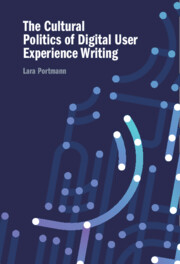Refine search
Actions for selected content:
3 results
11 - Conclusion
-
- Book:
- Understanding the Language of Virtual Interaction
- Published online:
- 05 September 2025
- Print publication:
- 25 September 2025, pp 170-173
-
- Chapter
- Export citation

The Cultural Politics of Digital User Experience Writing
-
- Published online:
- 24 July 2025
- Print publication:
- 07 August 2025
15 - Practices of Genre Surveillance in Country Music
- from Part IV - Boundary Work
-
-
- Book:
- Whose Country Music?
- Published online:
- 03 February 2023
- Print publication:
- 01 December 2022, pp 226-240
-
- Chapter
- Export citation
